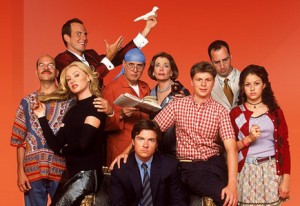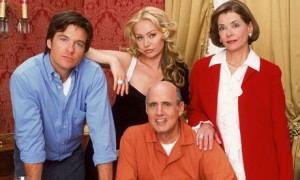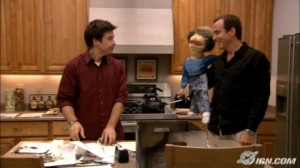 Fox Entertainment scrapped Arrested Development in 2006 after only three seasons. Apparently strong DVD sales and the show’s burgeoning cult status triggered a response in some studio office somewhere that the time was right to cash in, and so sometime soon a movie version of the TV series will be coming to a theatre near you. The naked greed behind this is perfect. Arrested Development was a brilliant series about the short circuiting of the American attention span, about our moral compass gone haywire, and a kinder gentler handling of this comedic treasure trove would seem inappropriate. I don’t have much desire to see the movie, but I do encourage anyone out there who hasn’t seen the series to check it out on Netflix or buy or rent the series. It’s crazy funny.
Fox Entertainment scrapped Arrested Development in 2006 after only three seasons. Apparently strong DVD sales and the show’s burgeoning cult status triggered a response in some studio office somewhere that the time was right to cash in, and so sometime soon a movie version of the TV series will be coming to a theatre near you. The naked greed behind this is perfect. Arrested Development was a brilliant series about the short circuiting of the American attention span, about our moral compass gone haywire, and a kinder gentler handling of this comedic treasure trove would seem inappropriate. I don’t have much desire to see the movie, but I do encourage anyone out there who hasn’t seen the series to check it out on Netflix or buy or rent the series. It’s crazy funny.
 According to the interviews of Ron Howard, the series’ executive producer, and others on the DVD, the inspiration for the show was the collapse of Enron and the question: What would happen to a rich American family wiped out in a corporate scandal? Arrested Development answers this question and beat the Bursting of the Real Estate Bubble and the crumbling of Wall Street by three years. Set in Orange County (though filmed in Los Angeles around Marina Del Rey), the series chronicles the Fall and subsequent Rise of the Bluth Family whose fortunes derive from a real estate empire built upon quicksand. The adult Bluth children exist as parasites on their parent’s shifting wealth, forced to live in a model home in an abandoned suburban development which looks like a toy model from the outside. The Bluth matriarch played Jessica Walter lives in a posh waterfront condo with one her demented adult children, while the Bluth paterfamilias (Jeffrey Tambor) has taken up residence at a minimum security prison. The show seems funnier today with all the multiplying references resounding in the daily press: Bernie Madoff; the Wall Street Bailout; the machinations of Goldman Sachs; Fox News; abandoned Greenwich mega-mansions; ludicrously hypocritical demands by the Republican Party for “austerity;” etc.
According to the interviews of Ron Howard, the series’ executive producer, and others on the DVD, the inspiration for the show was the collapse of Enron and the question: What would happen to a rich American family wiped out in a corporate scandal? Arrested Development answers this question and beat the Bursting of the Real Estate Bubble and the crumbling of Wall Street by three years. Set in Orange County (though filmed in Los Angeles around Marina Del Rey), the series chronicles the Fall and subsequent Rise of the Bluth Family whose fortunes derive from a real estate empire built upon quicksand. The adult Bluth children exist as parasites on their parent’s shifting wealth, forced to live in a model home in an abandoned suburban development which looks like a toy model from the outside. The Bluth matriarch played Jessica Walter lives in a posh waterfront condo with one her demented adult children, while the Bluth paterfamilias (Jeffrey Tambor) has taken up residence at a minimum security prison. The show seems funnier today with all the multiplying references resounding in the daily press: Bernie Madoff; the Wall Street Bailout; the machinations of Goldman Sachs; Fox News; abandoned Greenwich mega-mansions; ludicrously hypocritical demands by the Republican Party for “austerity;” etc.
 Arrested Development skewers Orange County and the Enron Era (which is ongoing) and yet it isn’t overtly political. It assumes we are all the spoiled children of rich greedy Republican parents, living on borrowed time and over extended credit cards, or at least we are all capable of such behavior given the chance. In one sequence, one of the Bluth children named Gob played by Will Arnett is temporarily given a position of importance at the family company. Gob, a dumbbell whose one ambition in life is to become a Las Vegas style magician and who’s completely bereft of talent or intelligence, inexplicably becomes the office sadist, the manager whose incompetence and arbitrariness makes life hell for the employees of the Bluth Company. Gob is giddy with power and it’s funny and horrific at the same time — who hasn’t worked for such an idiot at some point? What’s funny about the Bluths is their casual disregard for their bankrupt state and the single mindedness with which they are driven to pursue their self interests. With the exception of the characters played by Jason Bateman and Michael Cera, the dutiful father and son team who function as comic foils for the others, everyone in the family lives in a world of fantasy and greed. There was an attempt at presenting all this in a mock documentary, jittery fast hand-held camera style, which is at odds with the way the jokes are developed — long evolving running gags. When the show was aired, I watched bits and pieces of the original broadcasts, and something in the delivery turned me off and I abandoned the series. It was only later when I watched the series straight through on DVD that the nutty universe opened up to me. Arrested Development requires a certain commitment — the more episodes you watch the funnier the show gets because the gags build on each other and collide and multiply and then are cast off.
Arrested Development skewers Orange County and the Enron Era (which is ongoing) and yet it isn’t overtly political. It assumes we are all the spoiled children of rich greedy Republican parents, living on borrowed time and over extended credit cards, or at least we are all capable of such behavior given the chance. In one sequence, one of the Bluth children named Gob played by Will Arnett is temporarily given a position of importance at the family company. Gob, a dumbbell whose one ambition in life is to become a Las Vegas style magician and who’s completely bereft of talent or intelligence, inexplicably becomes the office sadist, the manager whose incompetence and arbitrariness makes life hell for the employees of the Bluth Company. Gob is giddy with power and it’s funny and horrific at the same time — who hasn’t worked for such an idiot at some point? What’s funny about the Bluths is their casual disregard for their bankrupt state and the single mindedness with which they are driven to pursue their self interests. With the exception of the characters played by Jason Bateman and Michael Cera, the dutiful father and son team who function as comic foils for the others, everyone in the family lives in a world of fantasy and greed. There was an attempt at presenting all this in a mock documentary, jittery fast hand-held camera style, which is at odds with the way the jokes are developed — long evolving running gags. When the show was aired, I watched bits and pieces of the original broadcasts, and something in the delivery turned me off and I abandoned the series. It was only later when I watched the series straight through on DVD that the nutty universe opened up to me. Arrested Development requires a certain commitment — the more episodes you watch the funnier the show gets because the gags build on each other and collide and multiply and then are cast off.
 Everyone has his favorite Arrested Development bit: the never-nude; the vicious seal; Portia De Rossi wearing a t-shirt emblazoned with the word SLUT; the way Jessica Walter’s Lucille Bluth assesses her children with lips pursed in disgust. Giving away the gags would be unfair. The structure of the series does not suggest it would adapt well as a feature length movie. The jokes won’t have much punch for those who don’t know the series. I’m willing to give the movie a try to see what they’ve come up with, but only with diminished expectation. Anyone interested in the movie who hasn’t seen the series first should rent the series. The movie should drive more people to the series and that’s a good thing because one of the pleasures of Arrested Development is talking about it to people who know the series. Arrested Development deserves greater recognition and will probably get it. The Bluth Saga has become the story of our times. It’s as good as gold with a heart of tin.
Everyone has his favorite Arrested Development bit: the never-nude; the vicious seal; Portia De Rossi wearing a t-shirt emblazoned with the word SLUT; the way Jessica Walter’s Lucille Bluth assesses her children with lips pursed in disgust. Giving away the gags would be unfair. The structure of the series does not suggest it would adapt well as a feature length movie. The jokes won’t have much punch for those who don’t know the series. I’m willing to give the movie a try to see what they’ve come up with, but only with diminished expectation. Anyone interested in the movie who hasn’t seen the series first should rent the series. The movie should drive more people to the series and that’s a good thing because one of the pleasures of Arrested Development is talking about it to people who know the series. Arrested Development deserves greater recognition and will probably get it. The Bluth Saga has become the story of our times. It’s as good as gold with a heart of tin.
– Mike Kowalski


